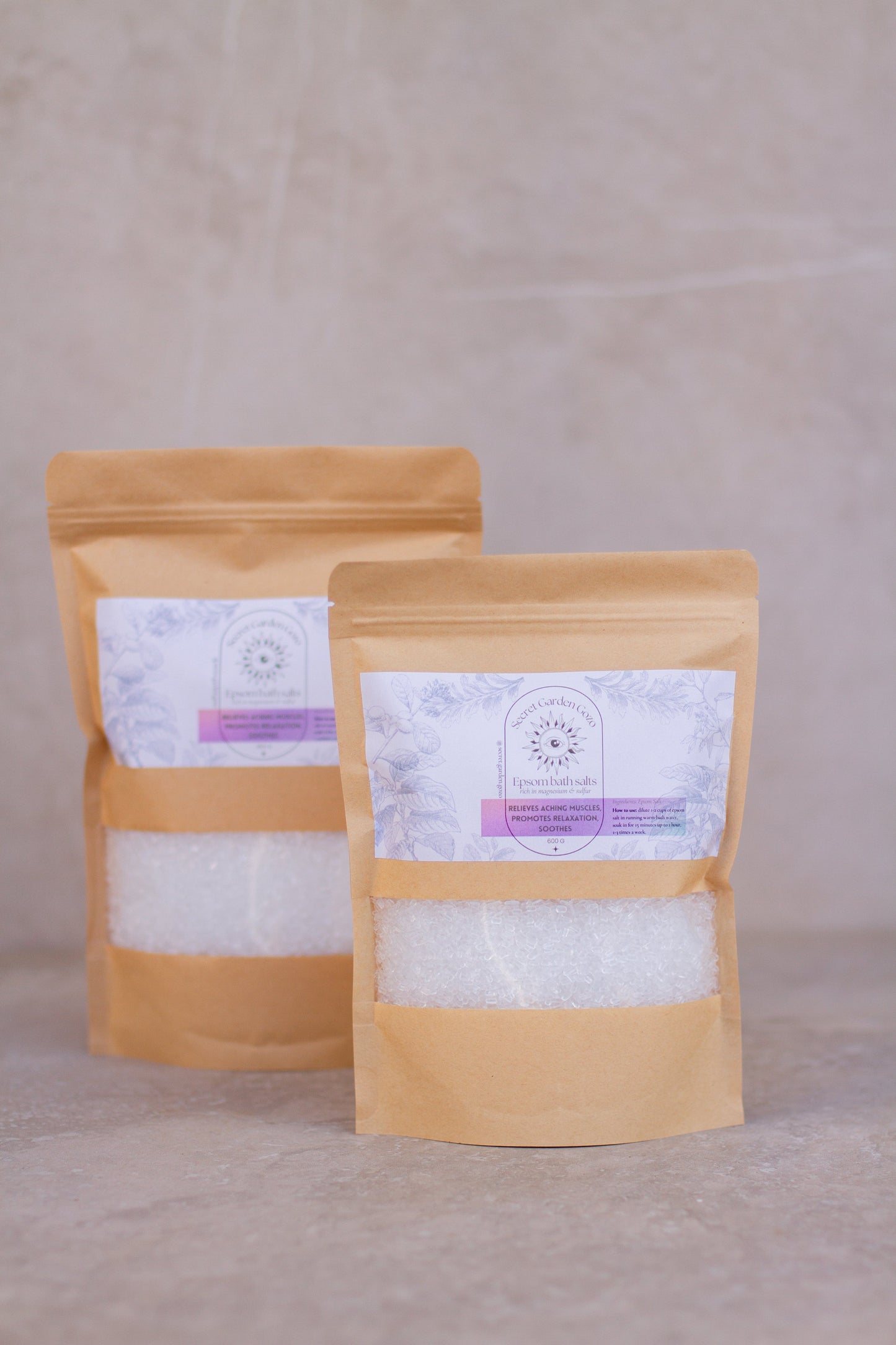Secret Garden Gozo
Epsom bath salts
Epsom bath salts
Couldn't load pickup availability
Ingredients: Epsom Salt
Epsom salt, chemically known as magnesium sulfate, has a wide range of uses due to its beneficial properties for both health and wellness. Here are some of the key benefits and uses of Epsom salt:
1. Muscle Relaxation and Pain Relief
- Soothing Sore Muscles: Epsom salt baths are popular for relaxing sore and tense muscles. The magnesium in Epsom salt is absorbed through the skin, which can help reduce muscle cramps, pain, and inflammation.
- Easing Joint Pain: It can be particularly helpful for those suffering from arthritis, as it can ease joint pain and reduce stiffness.
2. Stress Relief and Relaxation
- Reducing Stress: Magnesium plays a crucial role in stress management by promoting the production of serotonin, a mood-elevating chemical in the brain. A warm Epsom salt bath can help relax the mind and body, reducing stress and anxiety.
- Improving Sleep: The relaxation benefits of Epsom salt can also promote better sleep. Soaking in an Epsom salt bath before bed can help you unwind and prepare for restful sleep.
3. Detoxification
- Drawing Out Toxins: Epsom salt baths are believed to help draw toxins out of the body, promoting overall detoxification. The sulfate component helps the body flush out toxins and heavy metals through the skin.
- Supporting Lymphatic Health: Regular Epsom salt baths can support lymphatic health by reducing inflammation and improving circulation.
4. Skin Health
- Exfoliation: Epsom salt can be used as a gentle exfoliator to remove dead skin cells and reveal smoother, softer skin.
- Soothing Skin Irritations: It can help relieve itching and discomfort from conditions like eczema, psoriasis, and sunburn. It’s also effective in reducing inflammation from insect bites and minor rashes.
- Treating Acne: Epsom salt has antimicrobial properties that can help reduce the bacteria that cause acne, making it a good addition to a skincare routine for those with acne-prone skin.
5. Foot Care
- Soothing Tired Feet: Soaking feet in Epsom salt water can help relieve foot pain, reduce swelling, and soften rough skin and calluses.
- Treating Athlete’s Foot: Epsom salt has antifungal properties, making it useful in treating conditions like athlete’s foot.
6. Constipation Relief
- Natural Laxative: When taken internally (under the guidance of a healthcare provider), Epsom salt can act as a laxative to relieve occasional constipation. The magnesium sulfate works by drawing water into the intestines, which can soften the stool and make it easier to pass.
How to Use Epsom Salt
- Bath Soak: Dissolve 1-2 cups of Epsom salt in a warm bath and soak for 15-30 minutes to relieve muscle soreness, stress, and skin issues.
- Foot Soak: Add 1/2 cup of Epsom salt to a basin of warm water and soak your feet for 15-20 minutes.
- Exfoliation: Mix Epsom salt with a small amount of water or oil to create a paste, then gently massage onto the skin to exfoliate.
- Internal Use (Laxative): If recommended by a healthcare provider, dissolve 1-2 teaspoons of Epsom salt in a glass of water and drink it. However, internal use should be approached with caution and only under medical supervision.
Cautions
- Internal Use: Epsom salt can act as a laxative when taken internally, but this should only be done under the guidance of a healthcare provider. Overuse can lead to magnesium toxicity, dehydration, or other issues.
- Skin Sensitivity: While generally safe, some people may experience skin irritation from Epsom salt. It’s advisable to do a patch test if you have sensitive skin.
- Medical Conditions: Individuals with kidney disease, heart conditions, or other serious health issues should consult a healthcare provider before using Epsom salt, especially internally.
Conclusion
Epsom salt is a versatile remedy that can be used for muscle relaxation, stress relief, skin care, detoxification, and more.
Share

